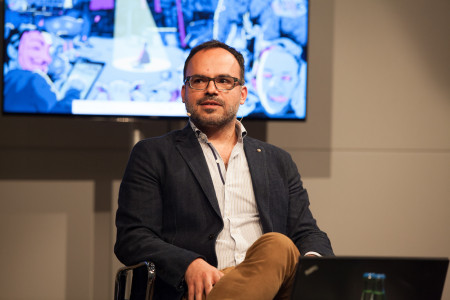By Sheikh Saaliq
Photos by Timmy Hung-Ming Shen
The Web, as envisaged by its inventors, was founded on the idea of Hyperlink – a link from a hypertext file or document to another webpage. Or maybe in easier terms: interconnectivity of the content on the Internet. But is our web-journalism interconnected?
Iran’s “blogfather”, Hossein Derakhshan, a freelance journalist believes that Facebook, Instagram and Twitter are killing the web or at least web journalism. Derakshan was speaking at Global Media Forum 2016 on the issue, Post-web Journalism: How can the media survive the shift? Derakhshan was incarcerated for six years for his blogging. The blogging revolution that overtook Iran in the early 2000s is often mentioned with some reference to Derakhshan.
Derakshan describes our current Internet structure as “television-internet”. “What we are seeing in form of news right now on the internet is linear, passive, programmed and inward-looking,” Derakshan says.
What he means by that is that there has been a slow departure from books-Internet toward a television-Internet in today’s web journalism. The non-linear mode of communication – which is mostly based on nodes, networks and links, and is the main factor for interconnectivity on the Internet – is missing. And this web was not envisioned at all.
“Our web journalism has become no different from the television these days. Most of the news consumption is happening through social media platforms like Facebook, Twitter etc where we consume news based on algorithms,” Derakshan said.
Derakshan believes that the news blogs are practically dead and the algorithm representation is the calling factor in today’s web journalism.
“It’s the age of algorithms. Algorithms decide what you’ll be fed on your timeline and what not. Today’s web journalism is prioritized by the algorithms where the dominant values are newness and popularity. These services carefully scan our behavior and delicately tailor our news feeds with posts, pictures and videos that they think we would most likely want to see. And this shouldn’t be the case. Our web journalism values should be based on quality and diversity,” Derakshan said.
In today’s web journalism age, the stream, mobile applications, and moving images are the dominant faces of news on the internet. Web journalism is no longer an interconnected network but a centralized social platform controlled with apps and tools where web pages are becoming irrelevant. And Derakshan believes that’s because of the demise of hyperlinks in our web journalism. But how is this shaping the future of the internet and what is its impact on our societies?
“The demise of hyperlink was caused by the social media and mobile applications. On Facebook there is no hyper linking, neither it’s on Twitter on Instagaram, which makes sure that you don’t go out from these platforms. Yes there are links which can be shared on these platforms by these days these platforms have their own browsers, again not letting you go out from these apps. Most social networks have created a closed, linear, centralized, sequential, passive, and homogenous space where users are encouraged to stay in all the time — a space that is more like television,” Derakshan said.
He suffices his argument with a very valid example. “A most brilliant paragraph by some ordinary-looking person can be left outside the stream, while the silly ramblings of a celebrity gain instant internet presence. It’s just because the system has been designed on that – popularity irrespective of it being bad or unrelated content. The stream means you don’t need to open so many websites any more. You don’t need numerous tabs. You don’t even need web browsers now,” Derakshan said.
Derakshan calls for a collaborative action to keep the vision of internet and web journalism alive. He believes that things like performance art can also be incorporated in today’s web journalism and we shouldn’t just limit ourselves to apps and streams.
“It’s high time to convert this so called online journalism to offline journalism. I’m not we need to get off the web, but the news on web should be more interconnected,” Derakshan said.
But is the post-web journalism actually taking us away from real news?






